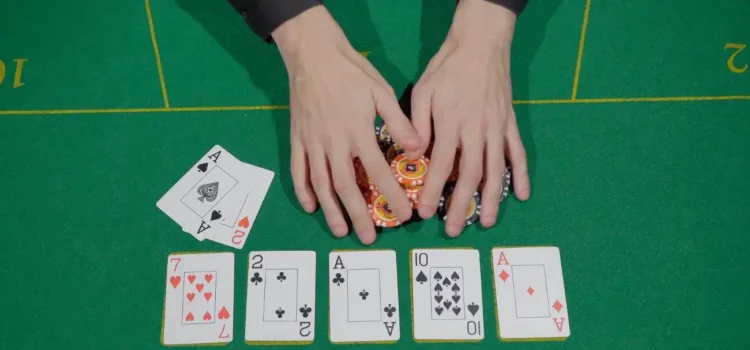When most people think about poker, they see it as a gambling game, primarily influenced by luck. The idea of poker as a game of chance, where players depend on the cards they are dealt, has been a common perception for generations. However, in recent years, attitudes toward poker have evolved. More people now acknowledge that poker involves a substantial amount of skill, decision-making, and strategy. These factors underscore that poker is more than just a pastime; it offers cognitive benefits that can translate to many aspects of real life.
Playing poker, whether professionally or casually, challenges the mind in various ways. Regular poker players refine skills that not only impact their performance at the table but also positively influence their personal and professional lives. Let’s explore some of the cognitive benefits poker provides and how these skills extend beyond the game.
The Mental Benefits of Poker in Daily Life
Poker is a challenging and mentally stimulating game. Players must evaluate their opponents’ strategies and make complex decisions under pressure. Research shows that people who play poker frequently can develop skills that aid in real-life decision-making. This game enhances players’ ability to read people, strategize effectively, and think creatively. These skills, often perceived as strictly related to the poker table, are highly transferable to other areas of life, including business, personal interactions, and even long-term planning.
1. Enhanced Business Acumen
Running a business can be as intense and unpredictable as a game of poker. Business owners must analyze risks, consider opportunities, and remain composed under pressure—qualities that are crucial for success. In poker, players face similar challenges; they must decide whether to fold, call, or raise based on incomplete information. This uncertainty forces poker players to trust their judgment and build confidence in their ability to make decisions.
In business, the same principle applies. Decision-making in high-pressure environments requires confidence and resilience, attributes that poker hones over time. Learning to identify patterns, assess risks, and capitalize on opportunities are core elements in both poker and entrepreneurship. Through playing poker, business professionals can develop these cognitive skills, boosting their ability to navigate challenges and make impactful decisions under pressure.
2. Risk Assessment and Management
Risk-taking is inherent in both poker and business, but it’s not about reckless decisions. Poker players are skilled at assessing probabilities and analyzing the game’s landscape. For instance, when players are dealt a weak hand, they evaluate the risks before deciding whether to go all-in or fold. This calculated approach helps poker players minimize unnecessary losses and maximize potential gains.
Similarly, effective business leaders weigh the risks of each decision, considering factors such as competition, market conditions, and potential outcomes. Poker teaches players to be more analytical, improving their ability to assess situations realistically and avoid making impulsive decisions. By applying poker strategies to business, individuals can learn to gauge risks accurately and make balanced choices.
3. Resilience Through Losing Streaks
Poker teaches players how to handle losses. Just as poker players face losing streaks, business owners often experience setbacks. In both scenarios, resilience is essential. Poker players learn to take losses in stride, moving on to the next hand without dwelling on previous mistakes. They recognize that failure is part of the game and that staying calm increases their chances of success in future rounds.
In business, setbacks are inevitable, but how one responds to them makes all the difference. Poker cultivates emotional resilience, enabling players to navigate rough patches without losing sight of their goals. This resilience can be particularly helpful for business owners, as it allows them to rebound from failures and continue pursuing their objectives with a clear mind.
4. Improved Emotional Intelligence
In poker, understanding other players’ emotional states can be as crucial as knowing the rules. Skilled players learn to read subtle cues, such as body language and facial expressions, which helps them anticipate their opponents’ moves. This skill translates well into real-life interactions, improving one’s ability to interpret non-verbal signals and respond empathetically.
For those in managerial or leadership roles, this heightened emotional intelligence is invaluable. Reading colleagues’ and employees’ emotions can lead to better communication, increased team cohesion, and improved morale. Poker trains players to stay attuned to others’ emotional states, fostering more meaningful relationships in professional and personal settings.
5. Practice and Persistence Lead to Mastery
Both poker and business require persistence, practice, and a willingness to learn from mistakes. Success in poker doesn’t happen overnight; it takes hours of study and experience to refine one’s skills. Each game offers new insights and opportunities for improvement, as players evaluate their decisions and identify areas for growth.
In business, similar persistence is necessary. Each experience, whether successful or not, contributes to one’s development. The more time dedicated to mastering a skill or concept, the less reliant one becomes on luck and the more strategic their approach becomes. This process of continuous improvement, reinforced by playing poker, strengthens an individual’s commitment to personal and professional growth.
Self-Control and Emotional Regulation
Another significant aspect of poker is the self-control players need to manage their emotions. Poker players know that letting emotions dictate their decisions can lead to poor judgment and unnecessary losses. Learning to control impulsive reactions, such as the urge to chase a loss or overreact to a strong hand, is a vital skill in poker. Experienced players understand when to step back, take a break, and return with a refreshed mindset.
This ability to self-regulate is beneficial outside the game as well. In stressful situations, staying calm and composed enables clearer thinking and better decision-making. Whether dealing with difficult conversations, high-stakes business negotiations, or personal challenges, the emotional maturity developed in poker allows individuals to approach problems with a balanced perspective.
Improved Focus and Concentration
Poker requires a high level of concentration, as players must focus on their hands, the community cards, and their opponents’ actions. This attention to detail improves players’ ability to maintain focus over extended periods, a skill that can be valuable in many aspects of life. Poker trains the brain to concentrate on multiple elements simultaneously, an ability that becomes particularly useful in fast-paced environments.
The extended focus required in poker can lead to improved multitasking skills and increased attention spans. This concentration, reinforced through regular gameplay, can enhance productivity and effectiveness in daily life, making it easier to tackle complex tasks with sustained attention.
Long-Term Cognitive Benefits: Potential Protection Against Degenerative Diseases
Some studies suggest that poker may help delay degenerative neurological diseases like Alzheimer’s and dementia. Engaging in mentally stimulating activities like poker encourages the brain to form new neural pathways and build cognitive resilience. According to a study led by Dr. Jeffrey Cummings, people who regularly play poker have a reduced risk of developing Alzheimer’s disease by as much as 50%.
These findings highlight the potential for poker to benefit cognitive health over the long term. The game’s demand for strategy, problem-solving, and focus stimulates brain activity, which may contribute to preserving cognitive function as one ages.
Learning to Handle Loss Gracefully
Loss is an inevitable part of poker, just as it is in life. Poker players develop the mental resilience to accept losses without letting them affect their mindset. When a player folds a hand or loses a game, they don’t dwell on it; instead, they learn from the experience and move forward. This ability to handle setbacks gracefully is crucial in many life situations, as it encourages adaptability and promotes a positive outlook.
Developing a “Poker Face” for Real-Life Situations
One of the most iconic aspects of poker is the “poker face.” Players learn to control their expressions and hide their emotions, preventing opponents from gaining insights into their hands. This skill has practical applications beyond the game. In professional settings, maintaining a calm and neutral expression can be beneficial in negotiations or sensitive conversations.
Learning to keep emotions in check and project confidence, even in challenging situations, can be an asset in business and personal interactions. A well-maintained “poker face” helps individuals navigate situations where showing emotion may not be advantageous, enabling them to maintain control over their interactions and decisions.
Conclusion
Poker offers a range of cognitive benefits that extend well beyond the card table. Through improved decision-making, risk assessment, emotional regulation, and enhanced focus, poker players gain skills that can positively impact various areas of life. Moreover, the mental stimulation provided by poker may even contribute to long-term cognitive health. As poker continues to be recognized as a game of skill rather than just chance, the game’s value in cognitive and personal development becomes increasingly clear. For those looking to build these skills, playing poker can be a rewarding and mentally engaging way to improve their cognitive abilities.





















